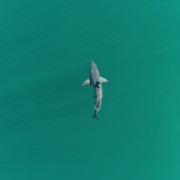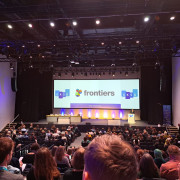- Science News
- Top news
- Frontiers is gearing up for COP28 to address the climate emergency
Frontiers is gearing up for COP28 to address the climate emergency
The United Nations Framework Convention on Climate Change (UNFCCC) parties meet every year at the Conference of the Parties (COP) to negotiate and agree action on how to tackle climate change, limit emissions, and halt global warming. These gatherings are the world’s highest decision-making body on climate issues and one of the largest international meetings in the world. COP28 will provide a milestone opportunity for the world to come together, course correct, and drive progress to keep 1.5C within reach – so we can meet the goals and ambitions of the Paris Agreement. It will be a pivotal moment for the world to unite around tangible climate action and deliver realistic solutions.

Photo credit: Kyle Anthony Photography
Addressing climate change, the paramount challenge of our era, hinges upon harmonizing fundamental human needs with sustainable climate remedies. Despite heightened awareness and global pledges, advancements in climate action have lagged and, at moments, fallen short. Confronting this hurdle, open science emerges as a pivotal force for innovation and a driver of groundbreaking solutions, playing a vital role in addressing climate change challenges.
As world leaders convene at COP28 in an effort to reach consensus on actions to prevent the planet from surpassing the 1.5-degree limit, making scientific data and publications openly accessible is a crucial component of any proposed strategy and measures. With numerous nations having embraced open science principles, a global agreement to strengthen them is within reach at COP28 and would constitute a tangible achievement.
FRONTIERS ON A MISSION
Open science platform Frontiers and the Frontiers Research Foundation will participate in the 28th session of the COP, taking place from 30 November to 12 December in Dubai, United Arab Emirates, to ascertain the undeniable power of open science and advance the mission to make science open so that scientists can collaborate better and innovate faster to deliver the solutions that enable healthy lives on a healthy planet.
As an open access publisher, Frontiers is committed to fostering open and transparent scientific communication and collaboration if we are to stand a chance to find solutions to the biggest challenge of our time. During COP28, Frontiers will showcase its latest initiatives to support global efforts to combat climate change, achieve the United Nations Sustainable Development Goals (SDGs), and fulfill the goal of becoming net-zero by 2050.
FRONTIERS IN ACTION AT COP28
The urgent nature of the climate crisis demands swift and comprehensive action. Our world stands at the cliff face of irreversible changes, each carrying severe consequences for life as we know it. To combat this, a diverse range of scientific solutions is imperative, and the most effective catalyst lies in making science open. It is the simplest and most cost-effective accelerator for scientific solutions and to save lives. To discuss the pathways towards innovative, sustainable solutions and actions, Frontiers will host several panels in Dubai featuring prominent experts and decision makers from policy, academia, and industry.
UN Climate Change Global Innovation Hub Opening Ceremony
This session will officially open the UN Climate Change Global Innovation Hub (UGIH) COP28 dialogue and feature high-level statements from UGIH supporting partners on their reasons for engagement and plans moving forward. Frontiers’ collaboration with the UGIH will be embodied in commitment to co-develop the Hub’s Digital Platform as a Knowledge partner and to assist in disseminating the UGIH workshops’ outcomes through Frontiers’ journals and Policy Labs, which will be consolidated in official signing of the Memorandum of Understanding between Frontiers and the UNFCCC. Moderated by Jorn Verbeeck, KPMG Sustainability and ESG Senior Manager and Board Member of EU Climate Neutral and Smart Cities Mission, the panel will include:
Nitin Arora, Project Manager, UN Climate Change Global Innovation Hub
Massamba Thioye, UN Framework Convention on Climate Change
Kirsten Dunlop, CEO, Climate-KIC
Dennis Pamlin, Executive Director, Mission Innovation
Martin Wainstein, Executive Director, Open Earth Foundation
Andy Deacon, Co-managing Director, Global Covenant of Mayor
Luis Neves, CEO, Global Enabling Sustainability Initiative
Frederick Fenter, Chief Executive Editor, Frontiers
Stephan de Haas, Head of Co-Creation and Client Consulting, T-Systems International.
Watch the session here.
Systems Change and Innovation for Climate and Sustainability Action
How can innovation serve climate and sustainability goals for the benefit of people and the planet? This is the question that will guide this high-level session, which will explore how a need-based and solution-oriented approach to innovation, combined with moonshot mindsets and systems thinking, can enable climate and sustainability solution providers to act appropriately. Additionally, the session will discuss identifying, developing, and scaling these transformative and ambitious solutions in alignment with climate goals. Moderated by Massamba Thioye, the panel will be represented by:
Catarina Selada, Head of Policy and Intelligence Unit, Centre of Engineering and Development
Jean-Claude Burgelman, Director, Frontiers Planet Prize, former Head of Open Science Unit, European Commission
Anna Stanley-Radière, Director, Climate Transparency, Co-leader, World Business Council for Sustainable Development
Mike Hayes, Climate Change and Decarbonization Leader, Global Head of Renewable Energy, KPMG International.
Watch the session here.
Open Science for Inclusive and Transformative Climate and Sustainability Innovation
Climate change requires global cooperation, yet reconfiguring infrastructure systems for a zero-carbon world proves cost-prohibitive for many nations. Recent events like the COVID-19 pandemic have demonstrated the power of open knowledge sharing to supercharge innovation and deliver timely solutions. Open science can offer equally transformative change when applied to the existential threats posed by climate change that respond to core human needs. Moderated by Henry Markram, co-founder of Frontiers and professor of neuroscience at the Swiss Federal Institute of Technology Lausanne (EPFL), this panel will explore the advantages of open science as an accelerator of inclusive and sustainable climate innovation. Private and public sector leaders will discuss the importance of making scientific results openly available in order to boost innovation, increase public consensus, and bolster political will to act. Panelists will include:
Vladimir Ryabinin, UNESCO Assistant Director-General; Executive Secretary, Intergovernmental Oceanographic Commission (IOC)
Maria Espinosa, former UN General Assembly President UNGA; former Ecuador External Affairs Minister
Diarmid Campbell-Lendrum, Climate Change and Health Unit Head, World Health Organization
Gavin McCormick, Executive Director, WattTime; Co-founder, Climate TRACE
Lars Peter Riishøjgaard, Director, World Meteorological Organization.
Watch the session here.
The timing of this panel corresponds to the official launch of the Open Science Charter, an initiative by the Frontiers Research Foundation, which urges governments, research institutions, and funders, as well as industry leaders and citizens of the world to commit and act in four main areas:
Unrestricted access to scientific knowledge by 2030: Commit to transitioning all published research articles from subscription to fully open-access models before the end of this decade.
Uphold peer-review quality: Preserve and champion the core values of scientific publishing, including registration, validation, certification, and perpetual conservation of scientific findings.
Transparent pricing linked to quality: Adopt transparent financial models that directly correlate the price of publication with the quality of services offered.
Strengthen trust in science: Make the knowledge available to the public who helped pay for it and who will benefit from its accessibility.
Read and sign The Charter here.
Pathways to a Sustainable Earth: Unlocking Solutions through Transformational Science
How can transformational science be used to unlock breakthrough, scalable solutions for our planet? This session will critically examine the key obstacles and challenges that must be addressed today to fully harness the potential of transformational science as the basis for policy discourse. It will also draw upon the expertise of diverse stakeholders and seek to find consensus on what the missing links are that translate science into action, and what most effective dissemination mechanisms and outlets are needed to bridge this gap. Moderate by Wendy Broadgate, from Future Earth and the Earth Commission, this panel will welcome the following panelists:
Sandrine Dixson-Decleve**,** Co-President, Club of Rome
Joeri Roelji, Director of Research, Grantham Institute; Professor of Climate Science and Policy, Imperial College London
Paul Behrens, Leiden University, Frontiers Planet Prize international champion 2023 (virtual)
Clea Kaske-Kuck, Director, Partnerships and Stakeholder Engagement, World Business Council for Sustainable Development
Lars Peter Riishøjgaard, Director, Global Greenhouse Gas Watch, World Meteorological Organization (WMO)
Frederick Fenter, Chief Executive Editor, Frontiers
Watch the session here.
Embracing Open Science for the Climate Crisis: Collaborative Solutions for a Resilient Future
The session will explore how various disciplines and stakeholders are navigating new frontiers of open science in the context of the climate crisis. It will offer international perspectives on current and future applications of open science in biodiversity, physical science, and ESG (environmental, social, and corporate governance), while seeking to find corporate-academia synergies using open science for community resilience. Moderated by Sheeba Nettukandy Chenoli of University Malaya, the panel will consist of:
Shaliza Binti Ibrahim, Deputy Vice-Chancellor, University Malaya; Co-Chair, Malaysia Open Science Alliance
Anna Pirani, Head, WGI Technical Support Unit (TSU), Intergovernmental Panel on Climate Change (IPCC)
Tan Sri Zakri Abdul Hamid, Technology and Innovation Cluster Lead, MNRECC Advisory Panel for COP28
Martin Siegert, Co-director, Grantham Institute – Climate Change and Environment
Dato’ Ami Moris, Board Member, University Malaya; Advisor, Maybank.
ADVANCING CLIMATE ACTION RESEARCH
COP28 in Dubai will witness the presentation of the new research article The Zero Emissions Commitment and climate stabilization, which was recently published in Frontiers in Science, Frontiers’ flagship multidisciplinary, open-access journal focused on transformational science. The article examines the concept of zero emissions commitment (ZEC), which quantifies the amount of global warming that would occur after greenhouse gas emissions are reduced to zero. In the piece, the authors review the current scientific understanding of ZEC, its uncertainties, and its implications for climate stabilization and policy. Such knowledge is an important addition in navigating transformative pathways towards a climate-stable future.
As this year’s COP28 marks another crucial milestone in the global response to the climate crisis, Frontiers has launched a new research topic to curate a collection of papers presenting COP28’s pressing discussions and themes as well as its outcome and solutions. The Advancing Climate Action: Insights from COP28 research topic is a collaborative effort across several Frontiers journals: Frontiers in Environmental Science, Frontiers in Sustainable Resource Management, Frontiers in Climate, Frontiers in Sustainable Cities, Frontiers in Sustainability, Frontiers in Ocean Sustainability, and Frontiers in Sustainable Energy Policy. It invites contributions from various disciplines and sectors on topics such as mitigation, adaptation, and resilience, in addition to cross-cutting issues such as equity, culture, and transformation. To learn more and submit your research, please visit this dedicated research topic page.
The climate emergency demands immediate action, and science plays a pivotal role in finding sustainable solutions. Open science, with its commitment to knowledge-sharing, can accelerate our response to the climate crisis and offer solutions. As we start COP28, the time for rhetoric is over. It is the time for action.
About Frontiers
Frontiers is the 3rd most-cited scientific publisher. We publish groundbreaking discoveries by the world’s top researchers. Scientists empower society and our mission is to accelerate scientific discovery by making science open. We place the researcher at the center of everything we do and enable the research community to develop the solutions we need to live healthy lives on a healthy planet. Featuring custom-built publishing technology, artificial intelligence, and rigorous quality standards, our research articles have been viewed more than 2.3 billion times, reflecting the power of research when it is open for all to read.
About the Frontiers Research Foundation
The Frontiers Research Foundation is a not-for-profit organization based in Switzerland, which was founded by Kamila and Henry Markram, neuroscientists from the Swiss Federal Institute for Technology (EPFL). It raises funds to support programs that accelerate scientific solutions for healthy lives on a healthy planet.
About Frontiers in Science
Frontiers in Science is Frontiers’ multidisciplinary, open-access journal focused on transformational science to accelerate solutions for healthy lives on a healthy planet. The journal publishes a select number of exceptional peer-reviewed lead articles invited from internationally renowned researchers, whose work addresses key global challenges in human and planetary health. Each lead article is enriched by a diverse hub of content that extends its reach and impact across society – from researchers and policymakers to lay audiences and kids.
See related articles by Frontiers in
The Financial Times:
World Economic Forum agenda:







